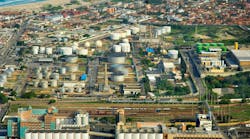Doris Leblond
OGJ Correspondent
PARIS, Nov. 9 -- Already in dire straits due to overcapacities and squeezed margins, France's refining industry will be unable to recoup the €230 million in losses incurred by the strikes that brought to a standstill for several weeks all of its refineries and the Marseille and Le Havre oil terminals, according to Jean-Louis Schilansky, president of oil trade group UFIP.
Schilansky outlined for OGJ the lessons to be learned from the strikes—an occurrence that has been described as “unprecedented” in France's long refining history (OGJ Online, Oct. 29, 2009).
“One has to find ways to prevent the country's energy and economic paralysis because refineries, ports, logistics, and imports are at a standstill,” he said. Access to the international emergency oil stocks system must be made easier, he said, adding that the country’s compulsory emergency stocks have only ever been used once—to help the US after Hurricane Katrina.
“It must become possible to deploy them more efficiently in a crisis to prevent strikes from having a devastating effect on the economy,” he said.
UFIP is currently giving much thought to other lessons that can be drawn from the recent events that would help industry and consumers alike to deal with a similar crisis. One suggestion he raised: as in the transportation industry, a minimum service should become compulsory at ports and refineries in the event of a strike. But it is not UFIP that can initiate such a move.
The slight upturn of refining margins, which occurred when France's 12 refineries were shut, is now over, Schilansky said, as the facilities are now back to normal operations. Overcapacities remain, he said, possibly worse than ever. He wasn't sure, however, how they could be resolved.
The import of some 100,000 tonnes/day of products—instead of the usual 25,000 tpd, to counter the shortages in France might well be a harbinger of future trends as more refineries outside Europe are coming on stream.
“We even imported from India,” Schilansky said, noting that this meant a departure from France's strict motor fuel specifications.
Schilansky said the companies that are worst off after the strikes are the independent refiners such as Ineos, Petroplus, and LyondellBasell. Integrated oil companies operating in France, such as Total SA and Esso, have upstream arms to help offset any downstream losses due to the strikes.

